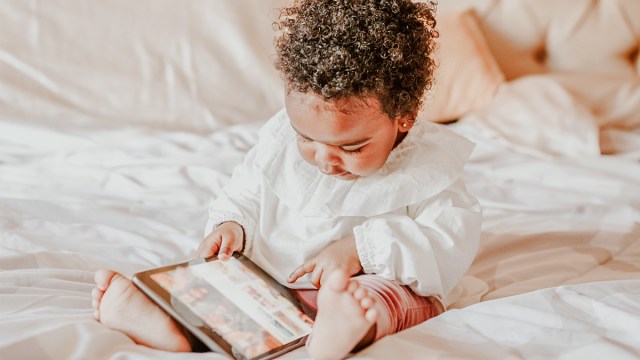What parent hasn’t resorted to some Elmo or Bluey time when faced with a squirmy one-year-old on an airplane or waiting for a never-on-time pediatrician? It’s inevitable. But a study looking at the impact of screen time on sensory processing has found that less is more when it comes to little kids and screens. “[E]arly-life television or video exposure was associated with atypical sensory processing in low registration, sensation seeking, sensory sensitivity, and sensation avoiding,” according to JAMA Pediatrics.
The study followed 1,471 children, half male and half female, and measured their viewing of television or video at 12 months, 18 months, and 24 months of age. This was followed up with a measure of sensory processing at around 33 months, when caregivers filled out surveys about each toddler’s reaction to sensory inputs like lights, textures, and noises.
Babies who watched any television or videos at 12 months of age were twice as likely to experience challenges in processing sensory information appropriately, as compared with their peers. At 18 months, kids with higher levels of screen exposure were found to have both difficulties in processing sensory information as well as a higher motivation to avoid sensory exposure. By 24 months, the researchers saw higher screen time linked to sensation seeking, sensory sensitivity, and sensation-avoiding behaviors.
This comes on the heels of another recent study linking screen time to developmental delays in children. However, the causal relationship between screen time and these negative developmental and sensory outcomes can’t be proven at this time. “Further research is needed to understand the relationship between screen time and specific sensory-related developmental and behavioral outcomes, and whether minimizing early-life exposure can improve subsequent sensory-related outcomes,” says the JAMA Pediatrics study. It’s also important to gather more updated data, since this research started a decade ago when kids were more likely to be watching TV or DVDs rather than tablets or mom’s phone.
“Considering this link between high screen time and a growing list of developmental and behavioral problems, it may be beneficial for toddlers exhibiting these symptoms to undergo a period of screen time reduction, along with sensory processing practices delivered by occupational therapists,” lead author Dr. Karen Heffler, an associate professor of psychiatry in Drexel’s College of Medicine, said in a statement.
Now, we know what some of you may be thinking: Oh great, another study telling me I’m messing up and can’t rely on screen time? But even study researchers wouldn’t take that away from you. The bottom line is, if you think you’re relying on TV time a bit too heavily, try to dial it back. And make sure to mix in lots of family time playing with your baby face-to-face, showing them a wide range of emotions and expressions, reading to them, and engaging with toys. It’s all about balance.
